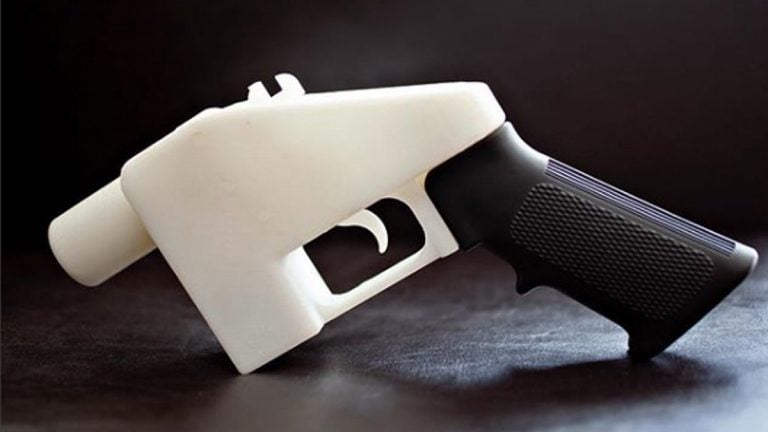N.J., Pa. join effort to block online instructions for 3D-printed guns
As of Monday evening, officials said, 1,000 people have already downloaded blueprints for AR-15 rifles.
Listen 2:24
3D printed gun (Defense Distributed/ Instagram)
Top officials in Pennsylvania and New Jersey are going to court to try to stop a Texas gun rights organization from releasing design plans for creating an untraceable gun on a 3D printer in their states.
The lawsuits join legal action from attorneys general in at least a dozen other states moving to suppress the online blueprints after the Trump administration cleared the way for their mass release.
The man at the center of the legal firestorm is Cody Wilson, a self-described crypto-anarchist who is known for pushing regulatory limits in his quest for extreme freedom.
Law enforcement officials in New Jersey and Pennsylvania, however, see that as extremely dangerous. And U.S. Rep. Frank Pallone, D-New Jersey, said Monday he was drafting legislation to ban 3D-printed firearms.
“It’s not only that it is not detectable through any kind of electronic device, but you produce it without having to go to a store or do anything. So you produce it your backroom,” Pallone said Monday. “And you proceed to go out and kill people. It’s the worst possible situation.”
Allowing anyone with an internet connection and a 3D printer to make a gun is indeed alarming, said state officials. There are no age verifications, no background checks, and the plastic weapons carry no serial numbers.
“Once these untraceable guns are on our streets and in our schools, we can never get them back,” said Pennsylvania Attorney General Josh Shapiro.
Wilson’s Texas-based nonprofit, Defense Distributed, has agreed to prohibit internet users in Pennsylvania and New Jersey from obtaining the blueprints until the legal actions are resolved.
“I’m blocking access as a courtesy to the court. I volunteered to do that,” said Josh Blackman, lawyer for Defense Distributed. “The court didn’t order us to do that.”
According to Blackman, unless a judge prevents the nonprofit from unleashing the 3D gun plans, he planned to disseminate them, “maybe later this week.”
As of Monday evening, officials said, 1,000 people have already downloaded blueprints for AR-15 rifles.
Organization claims violation of civil rights
Shortly after agreeing to pause distributions in a number of locations, the organization filed a civil rights lawsuit against New Jersey and the city attorney of Los Angeles for violating its free speech rights and launching “an ideologically fueled program of intimidation and harassment.”
On the pending civil actions Defense Distributed now faces, Blackman called it nothing short of government censorship.
“This suit is not at all about the printing. That’s what they’re trying to finagle. They’re trying to confuse people,” Blackman said. “If people in Pennsylvania or Philadelphia print a firearm, local law enforcement can deal with that. What they’re trying to do is reach into other states and shut down putting information on the internet.”
Officials in New Jersey sent the group a cease-and-desist letter, demanding the company stop operating in the state. On Monday, New Jersey Attorney General Gurbir Grewal filed suit.
“Because the guns would be printed without serial numbers, they would be untraceable by law enforcement, making it all the more difficult to solve crimes committed with these weapons,” Grewal said, noting that once the directions spread, “Pandora’s box … can never be closed.”
After a lengthy legal battle started during the Obama administration, Defense Distributed reached a settlement with Trump officials that allowed it to release the 3D printing directions as of Wednesday. That set off last-minute legal maneuvers by states to prevent the release, but the files went up Friday evening — five days early.
Blackman has argued that many critics are ignoring the ways the design schematics can be harnessed.
“These files have lots of uses,” he said. “They’ve been displayed in museums. And studied in academic institutions. There’s lots of value to speech, not only for manufacturing the guns, and the government can’t censor it.”
Phil Gregory contributed to this story.
WHYY is your source for fact-based, in-depth journalism and information. As a nonprofit organization, we rely on financial support from readers like you. Please give today.



